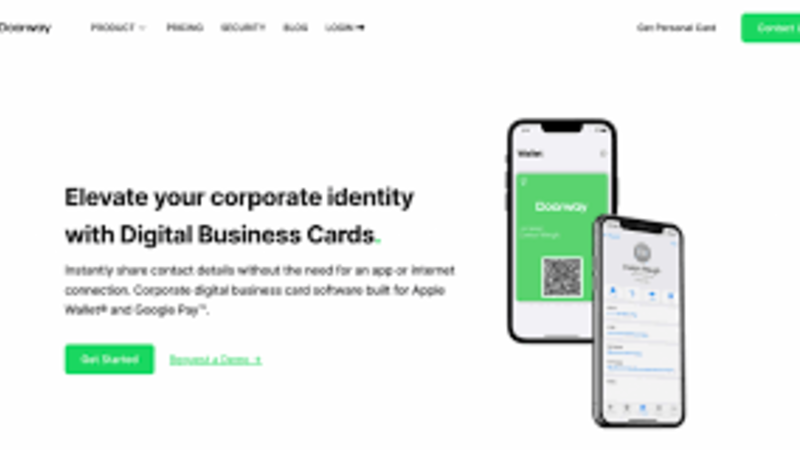In the age of digital transformation, traditional networking practices combined with innovative technologies have led to the creation of digital business cards. Dynamic tools offer almost seamless ways of exchanging contact information and converting new connections into digital links within this expanding digital universe.
This article details the numerous opportunities digital business cards have opened up and further discusses the benefits and strategies involved with integrating digital business cards with CRM to optimize efforts in networking and streamline relationships with customers.
Streamlined Lead Capture
This changes the entire process of capturing a lead when CRM systems are integrated with digital business cards: it minimizes manual entries into an automated workflow.
Professionals easily capture contact information with metal NFC business cards by scanning QR codes, emailing virtual cards, and using NFC. This ensures optimum accuracy in lead capture without the need for time-consuming manual entry and the associated risks of error and duplication.
Enhanced Data Accuracy and Completeness
CRM systems have to be in synchronization with digital business cards to ensure there is one repository for updated, accurate contact information. Digital business cards help capture contact details electronically so that the information is correct and complete.
That would make a company have a single source of truth for customer data, with no silos and inconsistencies—very basic obstacles for creating effective lead nurturing, segmentation, and personalized communication strategies.
Advanced Lead Qualification and Segmentation
A lot more information can be captured with digital business cards—integrated directly into CRM systems—than just contact information. Professionals can tailor digital business cards to include fields or dropdowns for interactivity to receive extra insights, such as industry, job title, interests, or purchase intent.
That data will be rich enough for you to have your organization pinpoint the segmentation of leads so you can focus on your high-value prospects and marketing efforts for well-identified audience segments, hence bringing the highest impact.
Seamless Follow-Up and Relationship Building
They are also integrated digital business cards that follow up on activities related to building relationships through the CRM system. Automated workflows, triggered on previously set criteria, also remind, task, or send email sequences, enabling each follow-up to be both timely and relevant with leads and contacts.
In other words, the organizations get to reinforce, build trust, and drive engagement through relationship nurturing with timely and relevant follow-up.
Insightful Networking Performance Analysis
Digital business cards integrated with a CRM system allow one to view important facts regarding networking efforts and performance metrics.
This offers visibility on CRM dashboards and reports of the channels where the leads came from, the rates of conversion, and the performance of the pipeline an organization holds, and, in effect, allows the tracking of effort efficacy toward the strategies of management in networking.
Compliance and Data Security Considerations
Digital business cards must be integrated into CRM systems in full compliance with data protection regulations, such as GDPR, CCPA, or HIPAA. An organization is obligated to have strong security measures for the storage of sensitive data for customers so that it remains compliant with data privacy laws.
The encryption of data transmissions, the implementation of access controls, and regular audits of systems are measures that can be taken to mitigate the possibility of data breach or unauthorized access.
Personalized Marketing Campaigns
Integration of CRM with digital business cards helps send automated, highly customized marketing campaigns that are relevant to the interests and preferences of individual contacts.
An organization can effectively segment its audience and, therefore, craft targeted marketing messages that are relevant to specific customer segments by leveraging the rich data gathered through digital business cards.
Real-Time Data Syncing and Updates
In digital business cards integrated with CRM systems, in case any changes are made to the contact update data, the update becomes instant and editable at the same time in the CRM system, which provides a manual updating feature, helping to avoid the risk of out-of-date and incorrect information.
Seamless Integration with Other Business Systems
Digital business card solutions that work with CRM can often be integrated into other business systems and applications with ease, for example, with platforms for email marketing, sales automation, and customer service applications.
Such integration thus supports a harmonious, singular ecosystem into which information can flow relatively seamlessly among different systems and which allows organizations to facilitate efficiency in workflows, collaboration, and an integrated customer experience.
Conclusion
Businesses can use digital business cards that work to sync contact information, enrich data for leads, automate follow-up, and provide insights into networking performance to encourage business growth and success.
With a strategic approach to CRM integration, focusing on compliance and data security, organizations can harness the full potential of digital business cards for fostering meaningful connections to achieve their business success in today’s competitive landscape,
